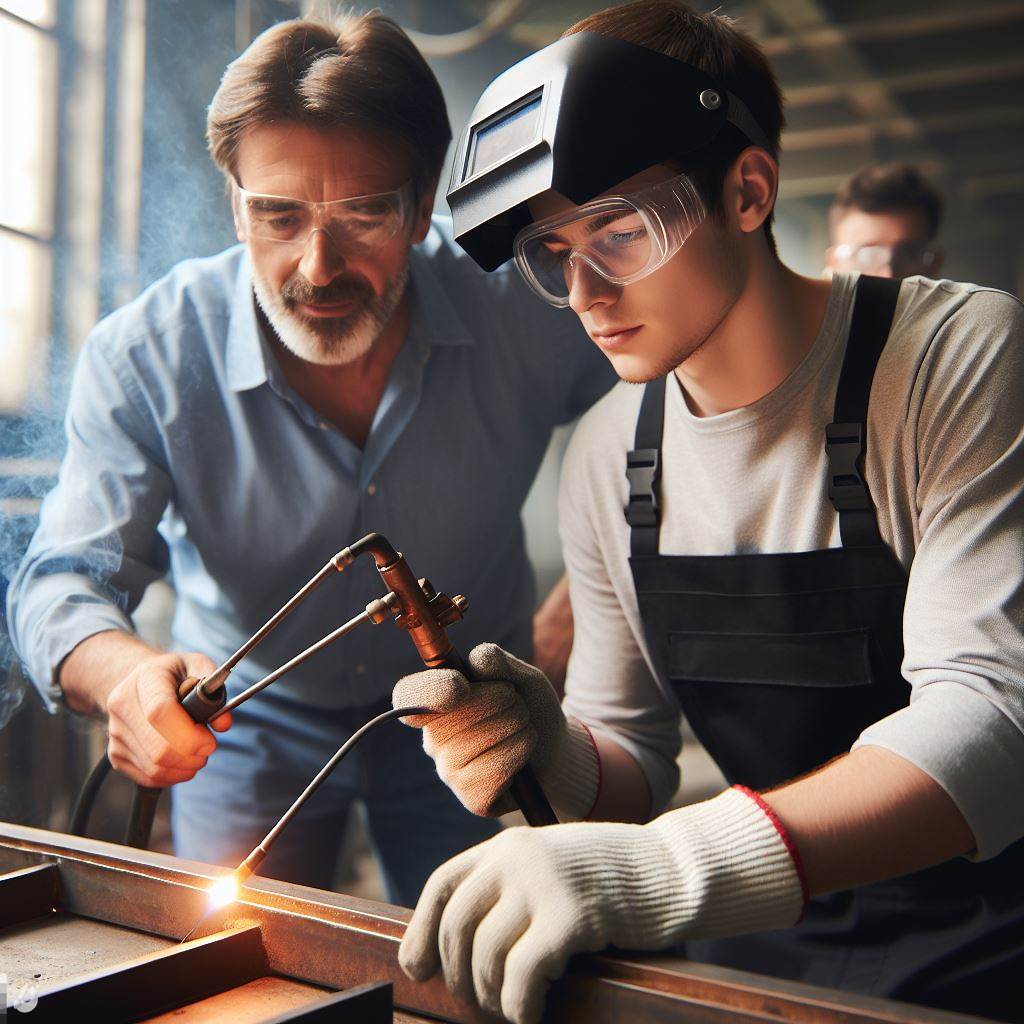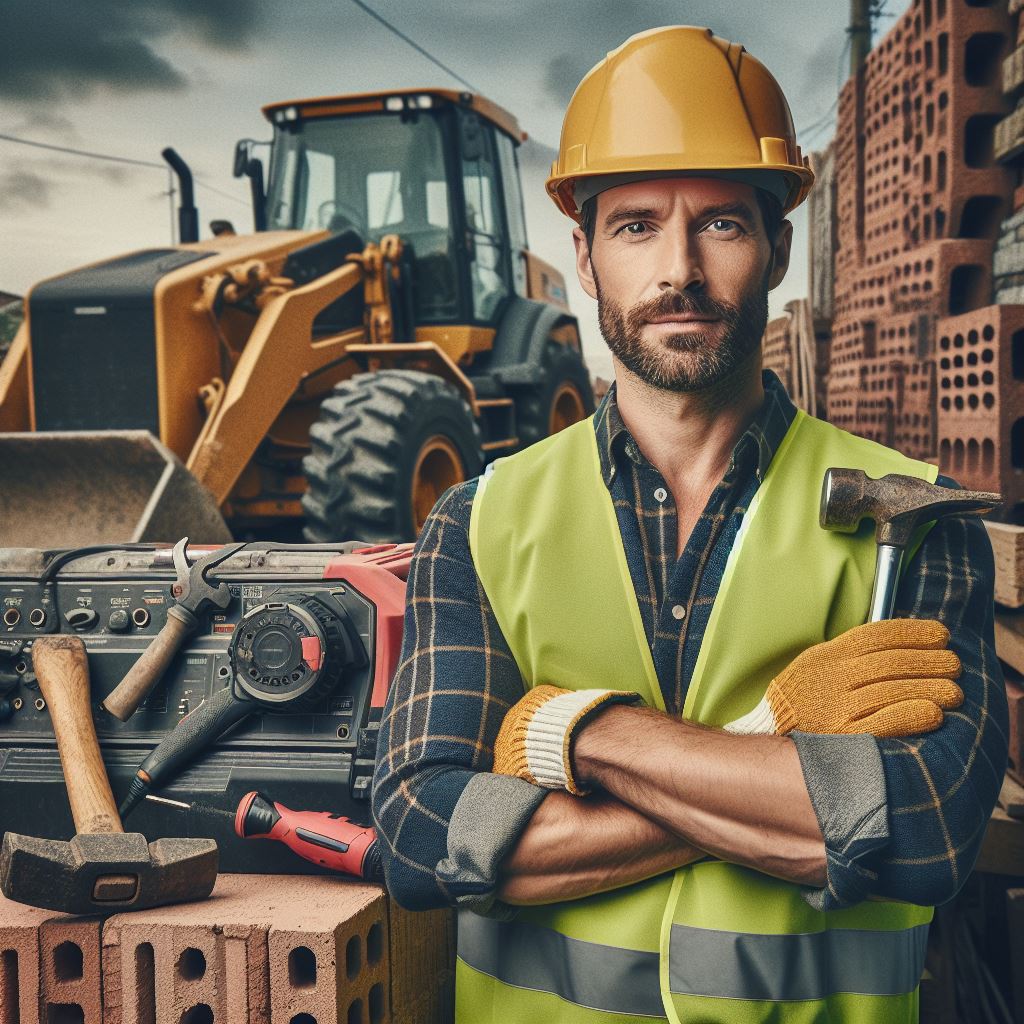Introduction
The construction industry is of significant importance in the UK, contributing to both economic growth and development.
It plays a vital role in various sectors, including infrastructure, housing, commercial buildings, and transportation.
The industry employs a large number of skilled workers who contribute to the overall progress of the nation.
One crucial role in the construction industry is that of welders.
Welders play an essential part in construction projects as they are responsible for joining metal components together.
Their expertise ensures the structural integrity of buildings, bridges, pipelines, and other infrastructure projects.
Welders work with various types of metals, including steel, aluminum, and stainless steel.
They use specialized equipment and techniques to join metal components, ensuring strong and durable connections.
Welding requires precision and attention to detail to maintain the integrity of the structure.
In addition to joining metal components, welders also perform tasks such as cutting, shaping, and polishing metals.
They work alongside engineers, architects, and other construction professionals to bring designs and plans to life.
Their skills and knowledge contribute to the successful completion of construction projects.
The demand for welders in the construction industry continues to grow, emphasizing the significance of their role.
Skilled welders are highly sought after and can enjoy rewarding career opportunities. As technology advances, welders must stay updated with the latest techniques and equipment to meet industry standards.
In short, welders play a crucial role in the construction industry in the UK.
Personalized UK Career Consulting
Receive tailored career guidance designed just for you. Get actionable steps and expert support to boost your career in 1-3 days. Take control of your career now.
Get StartedTheir expertise in joining metal components contributes to the structural integrity and durability of various infrastructure projects.
The demand for skilled welders highlights their importance in the industry and emphasizes the need for continuous learning and improvement.
Job Description of Welders in UK Construction
In this section, we will explore the job description of welders in UK construction, including the definition of welding, the primary responsibilities of welders, and the types of construction projects that require their expertise.
Definition of Welding
- Welding is a process that joins materials, typically metals, by melting and fusing them together.
- It involves using heat, pressure, or both, along with a filler material, to create a strong bond.
Primary Responsibilities of Welders
- Welders are responsible for reading and interpreting engineering drawings and specifications.
- They need to assess the materials required and determine the appropriate welding techniques.
- Welders must set up and operate welding equipment safely and effectively.
- They need to clean and prepare surfaces prior to welding, ensuring proper fit and alignment.
- Welders must monitor the welding process to ensure quality and make adjustments as needed.
- They are responsible for inspecting and testing welded joints to ensure they meet standards.
- Welders may also be required to perform maintenance and repair work on existing structures.
Types of Construction Projects that Require Welders
- Welders play a crucial role in various construction projects, including building and bridge construction.
- They are needed in the fabrication of structural components, such as beams, columns, and trusses.
- Welders are also essential in the construction of pipelines, both on land and underwater.
- They are often involved in the assembly and installation of metal frameworks and support structures.
- Welders may find employment in the manufacturing and installation of architectural metalwork.
- Infrastructure projects, such as highways, railways, and tunnels, also require skilled welders.
In fact, welders in UK construction have diverse responsibilities that involve reading and interpreting engineering drawings, setting up and operating welding equipment, and ensuring the quality of welded joints.
They are indispensable in various construction projects, including building construction, pipeline installation, and infrastructure development.
Read: Welding Certifications: Your UK Guide
Skills and Qualifications Required
Technical skills and knowledge
- Proficiency in reading blueprints and understanding technical drawings is essential for welders in UK construction.
- Welders must have a deep understanding of different welding techniques, such as MIG, TIG, and arc welding.
- Knowledge of various metals, their properties, and how they react during the welding process is crucial.
- Being able to operate and maintain welding equipment and tools is a fundamental skill for welders.
- Problem-solving skills are necessary to identify and address any issues or defects during the welding process.
Certifications and training
- Welders in the UK construction industry need to hold a valid welding certification, such as the Welding Certificate of Qualification.
- Obtaining additional certifications, such as the Welding Inspector Certification, can enhance career prospects for welders.
- Regular participation in training programs and workshops is essential to stay updated with advanced welding techniques and technologies.
- Continuous self-improvement and skill development through industry-specific courses and seminars are highly recommended.
- Knowledge of health and safety regulations and adherence to them is crucial for welders in the construction industry.
Physical strength and condition
- Welding in the construction industry requires physical strength and endurance to handle heavy equipment and materials.
- Good hand-eye coordination is necessary to ensure precise and accurate welding work.
- Having excellent manual dexterity allows welders to handle intricate welding tasks with precision.
- Wearing appropriate personal protective equipment, such as welding helmets and gloves, is vital to ensure safety.
- Maintaining a good level of overall physical fitness helps welders endure long hours of physically demanding work.
In essence, welders in UK construction require a combination of technical skills, certifications, and physical capabilities.
They need to possess technical knowledge in reading blueprints, different welding techniques, and metals, as well as the ability to operate welding equipment.
Certifications such as the Welding Certificate of Qualification and continuous training are necessary to stay competitive in the industry.
Furthermore, physical strength, hand-eye coordination, and manual dexterity are essential for precise and safe welding work.
By meeting these skills and qualifications, welders play a crucial role in ensuring the success and safety of construction projects in the UK.
Read: Essential Safety Gear for Welders in the UK
Demand and Job Opportunities
Growth of the construction industry in the UK
- The construction industry in the UK is experiencing significant growth in recent years.
- According to the Office for National Statistics, the industry’s output has been increasing steadily.
- The government has also been investing in infrastructure projects, further driving the industry’s expansion.
- This growth has led to a higher demand for skilled workers, including welders, in the construction sector.
Increasing demand for welders in the sector
- Welders play a crucial role in the construction industry, particularly in metal fabrication and installation.
- With the rising number of construction projects, there is a growing need for welders to join the workforce.
- Their expertise in joining and shaping metal components is essential for building and repairing structures.
- Welders are also important in ensuring the structural integrity and safety of various construction projects.
Job prospects and career advancement opportunities
- The increasing demand for welders in the construction sector translates to excellent job prospects.
- Skilled welders can expect to find ample employment opportunities in various construction companies.
- Welding professionals with extensive experience and specialized skills have better chances of career advancement.
- Advancement opportunities may include becoming welding supervisors or starting their own welding businesses.
- Welders can also pursue further education or certifications to enhance their skills and increase job prospects.
- Continuing professional development is essential for staying updated with the latest welding techniques and technologies.
In review, the role of welders in the UK construction industry is crucial, driven by the growth of the sector and increasing demand for their skills.
As the construction industry continues to expand, there is a rising need for welders to join the workforce.
Your Dream Job Starts with a Perfect CV
Get a tailored CV and cover letter that captures your unique strengths and stands out in your industry. Let us help you make an unforgettable first impression.
Get StartedJob prospects for welders are excellent, and there are ample opportunities for career advancement.
With the right experience and specialized skills, welders can expect to have a successful and fulfilling career in the construction sector.
Read: The Future of Welding Jobs in the UK Market

Welding Techniques and Equipment Used
Different welding techniques utilized in UK construction
- Shielded Metal Arc Welding (SMAW) is a commonly used technique in UK construction.
- Gas Metal Arc Welding (GMAW) is also popular due to its versatility and speed.
- Flux-Cored Arc Welding (FCAW) is used for outdoor construction as it works well in windy conditions.
- Gas Tungsten Arc Welding (GTAW) is best suited for precise and high-quality welds.
Types of equipment and tools welders rely on
- Welders require protective gear such as helmets, gloves, aprons, and safety glasses.
- Welding machines, including stick welders, TIG welders, MIG welders, and flux-cored welders, are essential tools.
- Various hand tools such as welding clamps, chisels, hammers, and wire brushes are used for preparation and finishing tasks.
- Abrasive cutting tools like angle grinders and plasma cutters assist in metal fabrication and shaping.
Importance of proper equipment maintenance and safety precautions
Proper equipment maintenance and adherence to safety precautions are critical for welders in UK construction:
- Maintaining welding machines ensures optimal performance and reduces the risk of malfunctions.
- Regular inspection and replacement of welding cables and leads prevent electrical hazards.
- Cleaning and lubricating tools and equipment help extend their lifespan and prevent accidents.
- Adhering to safety procedures such as wearing protective gear and using fume extraction systems protects welders from harmful fumes and sparks.
- Regular training and certification updates keep welders updated on safety practices and new technologies.
By following proper equipment maintenance and safety protocols, welders contribute to a safer work environment.
In brief, various welding techniques like SMAW, GMAW, FCAW, and GTAW are used in UK construction.
Welders heavily rely on equipment such as welding machines, protective gear, hand tools, and cutting tools.
Proper equipment maintenance and strict adherence to safety precautions are essential for the safety and efficiency of welders in the construction industry.
Read: Average Welder Salaries in the UK: 2024 Update
Challenges Faced by Welders in UK Construction
Work environment hazards and safety concerns
Welding in the UK construction industry comes with its fair share of challenges.
Work environment hazards and safety concerns pose a significant risk to the health and well-being of welders.
Exposure to harmful fumes, gases, and chemicals can lead to long-term health issues.
Additionally, high noise levels and intense light produced during welding can result in hearing impairment and eye injuries.
Physical demands and mental stress
Physical demands and mental stress are also major challenges faced by welders.
Optimize Your LinkedIn for Success
Boost your LinkedIn profile with a professional bio, keyword-rich headline, and strategic recommendations that attract recruiters. Stand out from the crowd and get noticed.
Optimize NowThe repetitive nature of welding tasks can lead to musculoskeletal disorders, causing discomfort and fatigue.
Welders often have to work in uncomfortable positions, adding to the physical strain.
They are also exposed to extreme weather conditions, further intensifying the physical demands of their work.
Furthermore, meeting project deadlines and working under tight schedules can cause mental stress and pressure.
The precision and attention to detail required in welding can be mentally exhausting.
Need for continuous skill development and adaptation to new technologies
Another challenge is the continuous need for skill development and the adaptation to new technologies.
The welding industry continuously evolves, and new techniques and equipment are constantly introduced. Welders need to hone their skills by learning to operate new machinery and tools.
They must also keep up with industry standards and regulations, which may require ongoing training and certifications.
Adapting to new construction methods and materials also necessitates flexibility and the acquisition of new welding techniques.
Staying updated on safety protocols and best practices is crucial to ensure compliance and personal safety.
In general, welders in UK construction face numerous challenges in their line of work.
They are exposed to work environment hazards and safety concerns on a daily basis.
The physical demands and mental stress can take a toll on their well-being.
Additionally, they must continuously develop their skills and adapt to new technologies to stay competent in the industry.
Overcoming these challenges requires resilience, dedication, and a commitment to maintaining high standards of safety and professionalism.
Salary and Benefits
Average salaries of welders in the UK
- Welders in the UK earn an average salary ranging from £20,000 to £40,000 per year.
- The actual salary depends on factors such as experience, qualifications, and location.
- Experienced welders with specialized skills can earn higher salaries.
- Welders working in industries like oil and gas tend to have higher earning potential.
Factors affecting remuneration
- Experience plays a significant role in determining a welder’s salary.
- Welders with several years of experience can negotiate higher wages.
- The level of specialization in welding techniques also affects remuneration.
- Welders with certifications or qualifications in specific welding processes may earn more.
- Location is another crucial factor, with higher wages offered in areas with higher costs of living.
Additional benefits and perks in the industry
- Health and pension benefits are commonly offered to welders in the UK construction industry.
- Many companies provide vacation and sick leave allowances, ensuring work-life balance.
- Opportunities for career development and training programs are available for welders.
- Some employers offer performance-based bonuses, rewarding exceptional work.
- Additionally, welders may receive protective gear and equipment allowances.
Overall, welders in the UK construction industry receive competitive salaries with potential for growth and additional benefits.
Experience, specialization, and location are significant factors influencing remuneration.
The industry also provides various perks, such as health benefits, career development opportunities, and allowances for protective gear.
With the continuous demand for skilled welders, the profession offers stability and potential for a rewarding career.
Conclusion
Welders play a vital role in UK construction, ensuring the strength and durability of buildings.
Welders are essential for joining metal parts, ensuring that structures can withstand the test of time.
Aspiring welders have a promising future in the construction industry, with high demand and potential for growth.
Welders are indispensable in UK construction, guaranteeing the safety and stability of buildings.
They play a crucial role in joining metal components, ensuring the structural integrity of various construction projects.
Furthermore, aspiring welders can find numerous opportunities in the construction sector, with room for career advancement.
Overall, the role of welders in UK construction is significant, and their expertise is highly valued in the industry.
[E-Book for Sale]
500 Cutting-Edge Tech Startup Ideas for 2024 & 2025: Innovate, Create, Dominate
$19.99 • 500 Tech Startup Ideas • 62 pages
You will get inspired with 500 innovative tech startup ideas for 2024 and 2025, complete with concise descriptions to help you kickstart your entrepreneurial journey in AI, Blockchain, IoT, Fintech, and AR/VR.




